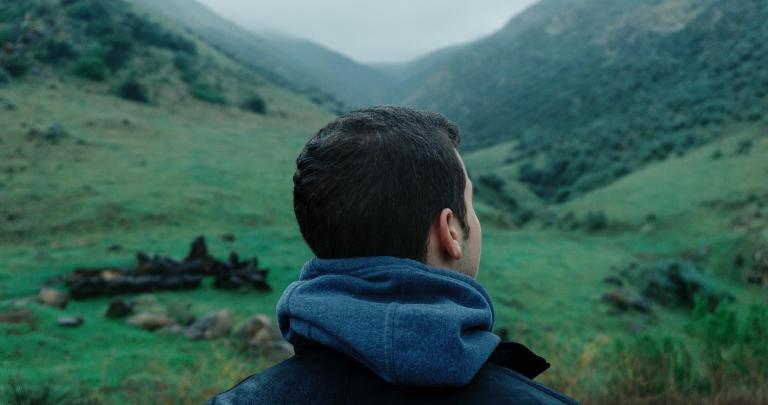
Find the whole #TravelswithmyMonkey series here
<<Previous post: Windmills of Your Mind: The Tyranny of Thought
Next post: How Paying Attention to My Mood Helps Me Cope with Anxiety and Feel Better >>
I know, you’ve heard it a thousand times. Stay present… live in the moment… just be here now! This little nugget has been popping up all over the place for thousands of years, and like many of our genuinely good ideas, it’s become a cliché. But don’t be fooled – this particular cliché can be a game changer.
We humans have a strong tendency to look for happiness in all the wrong places. We spend huge chunks of our time dreaming of a better future and reflecting longingly on those rose-tinted days gone by. We dwell on past conversations and the things we should have said whilst worrying about the countless ways in which things might go wrong in the days to come. Our minds, like mischievous monkeys, leap from one imagined past or future moment to another, never content to sit still and simply accept what is. But our inner monkeys, while they might mean well, are not to be trusted. They don’t realise that real contentment and happiness can only arise right here, and right now.
In our social media age we have become particularly bad at being present. The recent explosion of mindfulness in the West has taught many of us the importance of slowing down and paying attention, and scientific studies continue to demonstrate how effective focusing on the present moment can be at improving our mental health.
But unless we have some understanding and awareness of how our minds work, we can underestimate the incredible transformative potential that mindfulness holds. Mindfully eating a raisin or staring at a flower are a step in the right direction for sure, but such practices become far more meaningful and effective once you understand the reasoning behind them. And although you certainly don’t need to meditate for two hours a day to feel the benefits of mindful practice, neither should it be seen as a quick fix for serious mental health problems. As a cure it should be used with much caution and guidance, but as prevention it can work like magic.
Live in the present moment. Pay attention to what’s happening now.
It’s disarmingly simple yet completely counterintuitive. It’s completely accessible to anyone, yet really does have the power to change everything.
7 Reasons Why the Present Moment is the Best Place to Be
1. Because overthinking nearly always makes things worse.

Mental health problems like anxiety and depression are arguably a biproduct of our very human tendency to think too much. We seem to have this innate belief that we can think our way out of problems. In reality, thinking about a problem tends to make it seem bigger, so we feel worse about it, so we think about it more… and so the downward spiral continues. And when we are thinking about a problem, our attention has wandered away from the present moment into an imagined past or future.
I like to think of focusing on the details of the present moment as the equivalent of giving an overstimulated toddler an iPad. To prevent my inner monkey from wandering off and making me miserable, she needs constant distraction. Intentionally paying attention to the complexities of this present moment experience is usually enough to distract my monkey mind and stop a destructive thought spiral in its tracks.
2. Because happiness can only exist right here, right now.

Think of a time when you felt fully alive, exhilarated and happy. Maybe you were sitting by a campfire late at night, enjoying a magical first date or meeting your new baby for the first time. Can you recall any details? Sights, smells, sounds? And what were you thinking at the time? I’ll bet not a lot. I suspect your mind was so immersed in soaking up the fullness of that moment that there wasn’t space in your thinking brain for much else.
We tend to think that happiness will appear at some point in the future, when the stars align and we achieve our ambitions. But happiness doesn’t work like that. Unless we can train ourselves to be content with what is, we will be forever chasing that imaginary future and happiness will remain our ambition, not our reality.
Of course, being focused on the present moment doesn’t mean we will feel great all the time. But learning to be fully attentive and receptive to the experience of each moment as it arises means we are ready to soak up every delicious, juicy drop of happiness when it does make an appearance.
3. Because there is always far more going on in the present moment than meets the eye.

The present moment isn’t usually very exciting. At least, not at first glance. It’s the mundane, ordinary things like sitting in traffic, washing the dishes and walking the dog. Our inner monkeys are easily bored and would much rather find entertainment elsewhere. But if we can train them to pay attention to the details of the present moment, we can start to see that there is always far more going on than we realise. We can begin to notice things we usually overlook and appreciate things we’ve always taken for granted. We can develop a sense of curiosity and awe at the mind-blowing miracles of nature going on all around us every second of every day. And in learning to appreciate the depth and richness of each present moment, we can gradually develop a profound sense of contentment and gratitude that improves our experience of life, whatever our circumstances.
But in mindlessly going about our business, our attention everywhere and anywhere but here, we miss out on all the potential joy that lies latent, right under our noses.
4. Because the present moment is the only thing we can actually control.
We can’t change the past. We know this, and yet we still spend so much of our limited time on this planet reliving, regretting and becoming mentally tangled in things that have already happened. Likewise, although we can make good decisions now and plan for a prosperous future, most of what will actually occur lies beyond our control. The past and future, in fact, only really exist in our imagination here in the present.
I don’t like to think about how many hours and days I have wasted worrying about imaginary future scenarios that never materialised. The past is gone, the future might never happen, but the present moment is ours to experience, shape and appreciate in all its fullness. And the best part is that when we can learn to become truly content in the present moment, the past and future tend to take care of themselves.
5. Because in the present moment we can rewrite our own unhelpful framing stories.

We humans love to tell stories. We tell stories about ourselves, others and the world around us; they give our lives meaning and without them we feel lost. But sometimes these stories can be unhelpful, destructive even. We can become trapped by our own stories because we don’t realise that’s what they are – just the stories we tell ourselves. Think about the man who believes he is unlovable because of experiences in past relationships. Or the woman who resists trying anything new because past experiences have taught her to fear failure. Or how about the man in his fifties who believes he could never change his unhealthy lifestyle even if he tried, or the long-estranged sisters who believe there’s no hope of reconciliation? These stories are powerful and life-limiting, but they are also neither true nor helpful.
By learning to focus on the reality of the present moment and mistrust our own inner commentaries, it’s possible to start seeing these stories for what they are. They are just the stories we tell ourselves, and they can be rewritten.
6. Because everything in life is temporary.

Things change. It’s the only thing we know for certain. I can state with absolute certainty that this moment, the exact set of circumstances that combine to form my experience of right now, will never happen again. Ever. This knowledge is both wonderful and terrible. But either way, striving to exist fully in the present moment is the best response.
Think about it – if the present moment is full of joy and laughter, we don’t like to be reminded that it will inevitably end. But rather than dwell on that sad reality, it’s far better to immerse ourselves even more fully in the experience, recognising it as a gift and soaking up all the sweetness of the moment while we can. This moment will never happen again so we sure as heck better not miss it.
For some reason, when we are experiencing pain or negative emotions it’s often difficult to believe that they will come to an end. It’s as if we become temporarily blinded to any other possible reality. So in that place, the reminder that everything changes comes as a welcome relief. And focusing all our attention on the present allows us to experience the pain of the moment (not fun but usually necessary) whilst resisting the temptation to project our current pain into an imagined future. It’s much easier to deal with the pain of right now if it’s not compounded by a belief that it will somehow last forever.
7. Because there is always a better way to see.

We view reality through our own individual lenses. These lenses are coloured by our memories of past experiences, our individual beliefs and assumptions, and by how we feel at that precise moment. It’s very easy to forget that we all see things differently, and to mistake our own interpretations of reality as the only way to see. But it’s true – two people can have outwardly a very similar set of circumstances, but experience them very differently. What’s more, I myself could do the exact same thing in the same place on two separate days, and have two very different experiences.
It takes practice to be able to step back and notice our own coloured lenses, and to remember that there is always another perspective available. But paying careful attention to the sights, smells, tastes, sounds and sensations of the present moment can be a wonderful way to break loose from our own mental frameworks and gain a more expansive view. By really looking at the world in front of our eyes we can gradually become aware of our own biases, beliefs and interpretations. And once we are aware of them, we can be free from them.
The present moment can be like an escape hatch from the relentless whirring of our minds, the circular thought patterns that hold us captive. Or, like turning a gemstone and letting the light reflect from its many facets, if we explore the details of the present moment for long enough it can begin to transform before our eyes. As we begin to see our reality from different angles, new colours can emerge, illuminating not just the present moment but also our whole perception of past and future.
P.S. I need to make one thing very clear: if you are struggling with a mental health issue of any kind, find someone to talk to. Seek help. You are definitely not alone, and there are qualified professionals who are used to dealing with precisely the sort of thing you are experiencing. I am a massive believer in the benefits of education and self-help when it comes to mental health, but this should never replace professional, medical help when its needed. (Note: Of course, any muppet can write a self-help book. Discretion required.) Think of it this way: we can learn how to stay healthy by vacating the sofa once in a while and easing off the Dunkin’ Donuts, but that doesn’t mean we don’t go to the doctor when we think something’s not right. Same thing with mental health. Learning to help ourselves is crucial, but so is being unashamed to seek outside help when we need it.
If you are struggling, BetterHelp is great online counselling platform that gives you access to a licensed counsellor any time, anywhere via online chat, video or phone. As a more affordable and more flexible option than traditional counselling it’s a valuable resource for this time we find ourselves in.
Find the whole #TravelswithmyMonkey series here
<<Previous post: Windmills of Your Mind: The Tyranny of Thought
Next post: How Paying Attention to My Mood Helps Me Cope with Anxiety and Feel Better >>
Images via Pixabay













